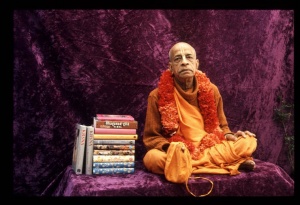CC Adi 7.14: Difference between revisions
m (1 revision(s)) |
No edit summary |
||
| Line 1: | Line 1: | ||
{{ | [[Category:Sri Caitanya-caritamrta - Adi-lila Chapter 07|C014]] | ||
<div style="float:left">'''[[Sri Caitanya-caritamrta|Śrī Caitanya-caritāmṛta]] - [[CC Adi|Ādi-līlā]] - [[CC Adi 7|Chapter 7: Lord Caitanya in Five Features]]'''</div> | |||
<div style="float:right">[[File:Go-previous.png|link=CC Adi 7.13|Ādi-līlā 7.13]] '''[[CC Adi 7.13|Ādi-līlā 7.13]] - [[CC Adi 7.15|Ādi-līlā 7.15]]''' [[File:Go-next.png|link=CC Adi 7.15|Ādi-līlā 7.15]]</div> | |||
{{CompareVersions|CC|Adi 7.14|CC 1975|CC 1996}} | |||
{{RandomImage}} | |||
==== TEXT 14 ==== | ==== TEXT 14 ==== | ||
<div | <div class="verse"> | ||
eka mahāprabhu, āra prabhu duijana | :eka mahāprabhu, āra prabhu duijana | ||
dui prabhu seve mahāprabhura caraṇa | :dui prabhu seve mahāprabhura caraṇa | ||
</div> | </div> | ||
| Line 12: | Line 16: | ||
==== SYNONYMS ==== | ==== SYNONYMS ==== | ||
<div | <div class="synonyms"> | ||
eka | ''eka mahāprabhu''—one Mahāprabhu, or the supreme predominator; ''āra prabhu duijana''—and the other two (Nityānanda and Advaita) are two ''prabhus'' (masters); ''dui prabhu''—the two ''prabhus'' (Nityānanda and Advaita Gosāñi); ''seve''—serve; ''mahāprabhura''—of the supreme predominator, Lord Caitanya Mahāprabhu; ''caraṇa''—the lotus feet. | ||
</div> | </div> | ||
| Line 19: | Line 23: | ||
==== TRANSLATION ==== | ==== TRANSLATION ==== | ||
<div | <div class="translation"> | ||
One of Them is Mahāprabhu, and the other two are prabhus. These two prabhus serve the lotus feet of Mahāprabhu. | One of Them is Mahāprabhu, and the other two are prabhus. These two prabhus serve the lotus feet of Mahāprabhu. | ||
</div> | </div> | ||
| Line 26: | Line 30: | ||
==== PURPORT ==== | ==== PURPORT ==== | ||
<div | <div class="purport"> | ||
Although Śrī Caitanya Mahāprabhu, Śrī Nityānanda Prabhu and Śrī Advaita Prabhu all belong to the same Viṣṇu category, Śrī Caitanya Mahāprabhu is nevertheless accepted as the Supreme, and the other two prabhus engage in His transcendental loving service to teach ordinary living entities that every one of us is subordinate to Śrī Caitanya Mahāprabhu. In another place in the Caitanya-caritāmṛta ([[CC Adi 5.142]]) it is said, ekale īśvara kṛṣṇa, āra saba bhṛtya: the only supreme master is Kṛṣṇa, and all others, both viṣṇu-tattva and jīva-tattva, engage in the service of the Lord. Both the viṣṇu-tattva (as Nityānanda Prabhu and Advaita) and the jīva-tattva (śrīvāsādi-gaura-bhakta-vṛnda) engage in the service of the Lord, but one must distinguish between the viṣṇu-tattva servitors and the jīva-tattva servitors. The jīva-tattva servitor, the spiritual master, is actually the servitor God. As explained in previous verses, in the absolute world there are no such differences, yet one must observe these differences in order to distinguish the Supreme from His subordinates. | Although Śrī Caitanya Mahāprabhu, Śrī Nityānanda Prabhu and Śrī Advaita Prabhu all belong to the same Viṣṇu category, Śrī Caitanya Mahāprabhu is nevertheless accepted as the Supreme, and the other two ''prabhus'' engage in His transcendental loving service to teach ordinary living entities that every one of us is subordinate to Śrī Caitanya Mahāprabhu. In another place in the ''Caitanya-caritāmṛta'' ([[CC Adi 5.142|''Adi'' 5.142]]) it is said, ''ekale īśvara kṛṣṇa'', ''āra saba bhṛtya'': the only supreme master is Kṛṣṇa, and all others, both ''viṣṇu-tattva'' and ''jīva-tattva'', engage in the service of the Lord. Both the ''viṣṇu-tattva'' (as Nityānanda Prabhu and Advaita) and the ''jīva-tattva'' (''śrīvāsādi-gaura-bhakta-vṛnda'') engage in the service of the Lord, but one must distinguish between the ''viṣṇu-tattva'' servitors and the ''jīva-tattva'' servitors. The ''jīva-tattva'' servitor, the spiritual master, is actually the servitor God. As explained in previous verses, in the absolute world there are no such differences, yet one must observe these differences in order to distinguish the Supreme from His subordinates. | ||
</div> | </div> | ||
__NOTOC__ | |||
<div style="float:right; clear:both;">[[File:Go-previous.png|link=CC Adi 7.13|Ādi-līlā 7.13]] '''[[CC Adi 7.13|Ādi-līlā 7.13]] - [[CC Adi 7.15|Ādi-līlā 7.15]]''' [[File:Go-next.png|link=CC Adi 7.15|Ādi-līlā 7.15]]</div> | |||
__NOTOC__ | |||
__NOEDITSECTION__ | |||
Revision as of 04:53, 6 July 2021

A.C. Bhaktivedanta Swami Prabhupada
TEXT 14
- eka mahāprabhu, āra prabhu duijana
- dui prabhu seve mahāprabhura caraṇa
SYNONYMS
eka mahāprabhu—one Mahāprabhu, or the supreme predominator; āra prabhu duijana—and the other two (Nityānanda and Advaita) are two prabhus (masters); dui prabhu—the two prabhus (Nityānanda and Advaita Gosāñi); seve—serve; mahāprabhura—of the supreme predominator, Lord Caitanya Mahāprabhu; caraṇa—the lotus feet.
TRANSLATION
One of Them is Mahāprabhu, and the other two are prabhus. These two prabhus serve the lotus feet of Mahāprabhu.
PURPORT
Although Śrī Caitanya Mahāprabhu, Śrī Nityānanda Prabhu and Śrī Advaita Prabhu all belong to the same Viṣṇu category, Śrī Caitanya Mahāprabhu is nevertheless accepted as the Supreme, and the other two prabhus engage in His transcendental loving service to teach ordinary living entities that every one of us is subordinate to Śrī Caitanya Mahāprabhu. In another place in the Caitanya-caritāmṛta (Adi 5.142) it is said, ekale īśvara kṛṣṇa, āra saba bhṛtya: the only supreme master is Kṛṣṇa, and all others, both viṣṇu-tattva and jīva-tattva, engage in the service of the Lord. Both the viṣṇu-tattva (as Nityānanda Prabhu and Advaita) and the jīva-tattva (śrīvāsādi-gaura-bhakta-vṛnda) engage in the service of the Lord, but one must distinguish between the viṣṇu-tattva servitors and the jīva-tattva servitors. The jīva-tattva servitor, the spiritual master, is actually the servitor God. As explained in previous verses, in the absolute world there are no such differences, yet one must observe these differences in order to distinguish the Supreme from His subordinates.